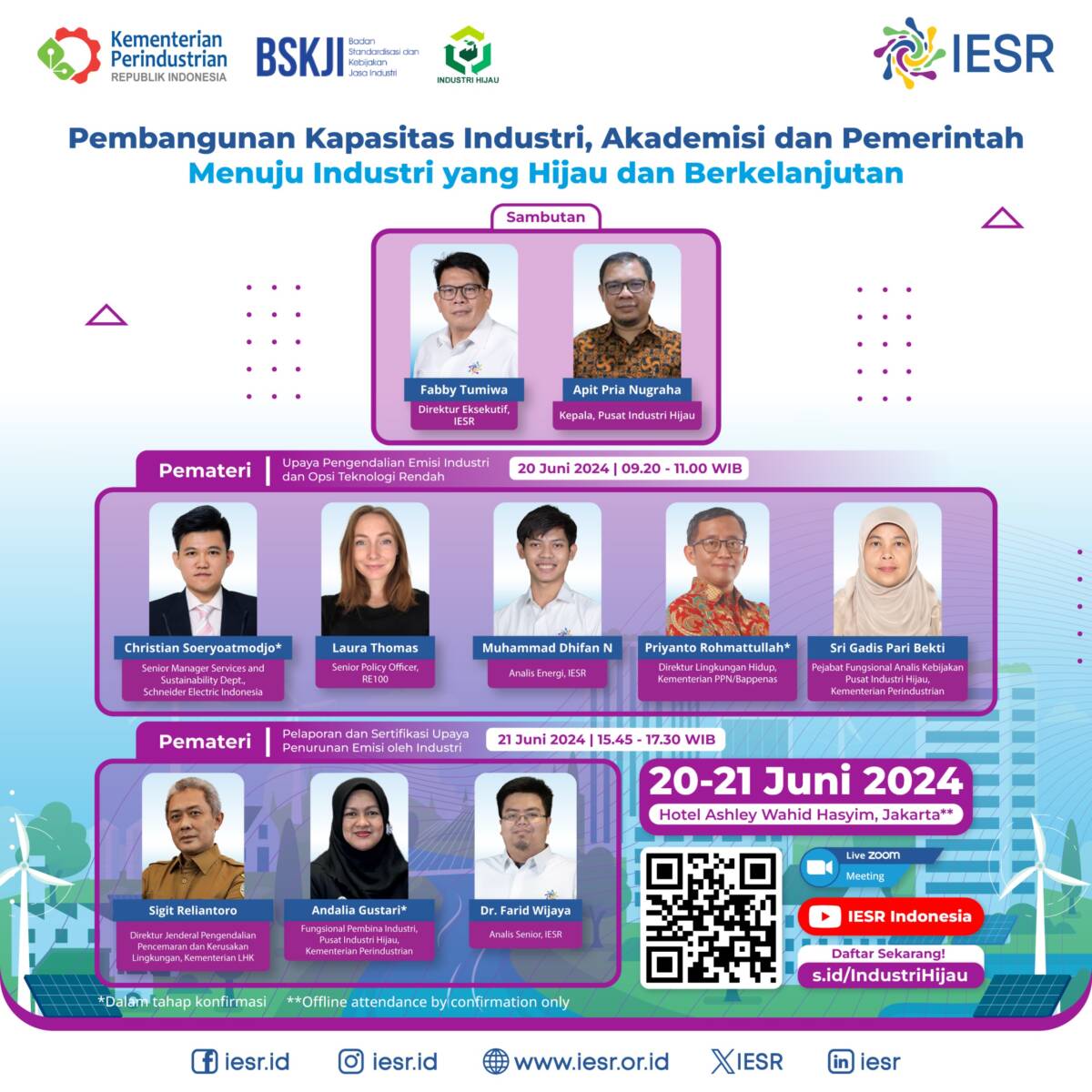
Capacity Building of Industry, Academia and Government Towards Green and Sustainable Industry
REGISTRATION FORM ONLINE
REGISTRATION FORM OFFLINE
Background
Indonesia, as one of the fastest growing economies in the world, faces a major challenge in ensuring that its growth is sustainable and environmentally friendly. With a growing population and rapid industrialization, the environmental impacts of industrial activities are becoming increasingly significant. One example of the impact of industrial activity on the environment is the increasing amount of emissions produced. By 2022, industrial sector emissions will have increased by 30% from the previous year to 430 million tons of CO2e. Therefore, it is important for various stakeholders in Indonesia, including industry, academia, and government, to understand and implement sustainability principles in their operations. It is hoped that the implementation of the right solutions can trigger a reduction in the amount of emissions produced by the industrial sector to eventually reach net zero by 2060, or sooner.
According to the Industry Decarbonization Roadmaps in Indonesia, there are five pillars to reduce industrial sector emissions. The five pillars are saving raw material resources, energy efficiency efforts, fuel substitution, replacement of more efficient and environmentally friendly production technology, and adoption of carbon capture technology or often known as CCS/CCUS. These pillars have been previously recognized by industry players and have been proven to save energy, raw materials and even production costs.
To encourage wider adoption of decarbonization pillars, IESR is organizing a workshop and exhibition titled ‘Capacity Building for Industry, Academia and Government Towards Green and Sustainable Industry’, as a first step to equip and sharpen the capacity of key stakeholders in the industrial sector in Indonesia. In this activity, registered participants will be taught key topics in transforming their business to be greener and more sustainable, including technical guidance in product lifecycle assessment, and sustainability reporting.
Activity Objective
In an effort to encourage industry players, academia, and government to work together in an effort to achieve net-zero emissions by 2060 or sooner, this activity aims to
- To provide an overview of low-carbon technology options that are effective in reducing industrial emissions,
- To increase technical capacity in product life cycle assessment and the preparation of sustainability reports in accordance with applicable standards, and
- To provide a space for building collaborations and partnerships with potential businesses, academics, and government in efforts to reduce industrial emissions in Indonesia.
Presentasi
Low Carbon Development Policy in Support of Industrial Sustainability (RPJPN 2025-2045) – Priyanto Rohmattullah
Kebijakan-Pembangunan-Rendah-Karbon-Dalam-Mendukung-Keberlanjutan-Industri-RPJPN-2025-2045-Priyanto-RohmattullahReducing Industrial Emissions through the Application of Low-Carbon Technologies – M Dhifan N
Reducing-Industrial-Emissions-through-the-Application-of-Low-Carbon-Technologies-M-Dhifan-N
Green Industry Development Policy – Sri Gadis Pari Bekti
Kebijakan-Pengembangan-Industri-Hijau
Schneider Electric – Green Industry
Schneider-Electric-Industri-HijauSpeakers
-
Fabby Tumiwa - Chief Executive Officer (CEO) - IESR
-
lr. Sigit Reliantoro - Direktur Jenderal Pengendalian Pencemaran dan Kerusakan Lingkungan - Kementerian LHK
-
Dr. Farid Wijaya - Senior Analyst in Materials and Renewable Energy IESR
-
Apit Pria Nugraha - Kepala Pusat Industri Hijau
-
Sri Gadis Pari Bekti - Pembina industri Pusat Industri Hijau - Kementerian Perindustrian
-
Laura Thomas - Senior Policy Officer - RE100
-
Muhammad Dhifan N - Energy Analyst IESR
-
Priyanto Rohmattullah - Direktur Lingkungan Hidup Bappenas
-
Fano Alfian Ardiansyah - Trainer ESG
-
Andalia Gustari - Fungsional Pembina Industri Pusat Industri Hijau - Kementerian Perindustrian
-
Muhammad Rizky Zen - LCA Trainer
-
Christian Soeryoatmodjo - Senior Manager Services and Sustainability Dept. Schneider Electric Indonesia

